I won’t lie to you – you aren’t my favourite all time presenter of Gardener’s World, that badge goes to Carol Klein ‘das Gritmeister’ (sorry Monty, pipped to the post), but you were at the helm during seven critical years when my gardening morphed from a weekend hobby to an all-consuming passion. I think you may be partly to blame and for that you have my admiration and respect both as a superb gardener and as a talented communicator.
I’ve loved all my gardens, but have always felt that the creation of pleasure in my small patch should not be at the expense of someone, or something else’s larger patch. If I thought that my choices had led to a worse outcome elsewhere, my pleasure in my own garden would be tainted. But like all decisions in modern life, it’s not always possible to figure out what is the best, or the least worst thing to do. It’s often just too complicated, or information is scant. Some choices however, do appear to a bit more clear cut and reducing peat extraction seems to be one of them. I won’t pretend to be an expert on peat sustainability. I understand that peat locks up carbon during its formation, as any fossil fuel does and that’s a good thing as it helps reduce atmospheric CO2. I understand that some peat habitats are unique and special and it would be desirable to leave them alone.
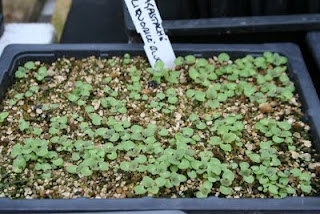
These things I understand to be true, but second hand, from information relayed to me by others. What I absolutely know, first hand, is that peat is not essential to good gardening. Large scale horticulture has adapted itself to take advantages of peat’s characteristics, to increase mechanisation and drive down costs. (It could adapt again, as needed). But for all amateur gardeners and most smaller nurseries it is more than possible, it is quite simply easy, to create a beautiful and productive garden and to produce plants commercially from seed and vegetative material without using peat at all.
I haven’t used peat for over 10 years. Until four years ago I was an amateur gardener, growing everything from leeks to Meconopsis in a sequence of increasingly large back gardens. In 2007 I took over a garden open to the public and a nursery producing 30,000 herbaceous perennials, shrubs, trees and annuals each year. I brought my gardening principles with me and the nursery has not used peat since I took over. We grow from seed, from cuttings, from divisions from the garden, from bare roots, plugs, liners, the works. Everything goes in commercially supplied peat free compost, sometimes with the addition of a little grit sand, or vermiculite for seeds. We grow salad and veg plants for our own little kitchen garden too. No special effort is required – in fact visitors comment daily on how healthy our plants look. They are currently flying out the door faster than I can restock.
As a private individual, I don’t much mind that you use peat now and again. I’m sure many of my own purchasing habits have equally dubious consequences (my dutch red pepper habit is probably high on the list). But I really mind very much that, as the nation’s Favourite Head Gardener, you have said publicly that, in effect, you can’t grow plants to your satisfaction without it. The amateur gardeners of the world listen to you, and the message is clear – if the great AT can’t grow without peat, then they surely can’t. And that, I’m sorry to say, is simply not true.
Along with many other contended peat-free growers who have been quietly getting on with it, letting visitors admire our produce first and telling them the provenance of our compost second, your message is a step back for the peat reduction cause. I wish wholeheartedly that you had used your huge influence to say something more positive about not using peat, or alternatively that you had said nothing at all. You probably feel that you are speaking up for the majority who still use peat, perhaps for lack an apparent good alternative, but mostly through lack of confidence.
I think your special status means you can and should lead from the front, help drive up demand for high quality peat-free composts, to thus drive up standards and give gardeners the confidence to follow your lead. That’s what I wish you’d said. I sincerely regret that you didn’t.
Yours affectionately, (but a little less so than two weeks ago)
Sue
PS -it will come as no surprise to say that all the seedlings and plants pictured above have spent all their lives in peat free compost. I took all these pics this week – they just happen to be what we have here now. And if we can do it, you can, and so can anyone else.
To read Alan’s pro-peat use piece in the Express, click here
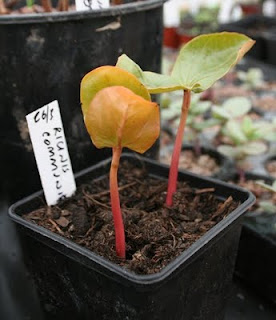
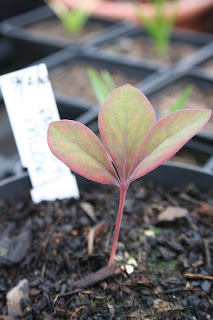
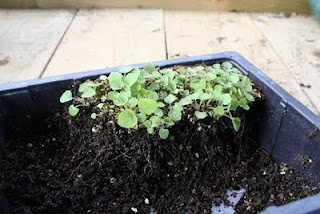
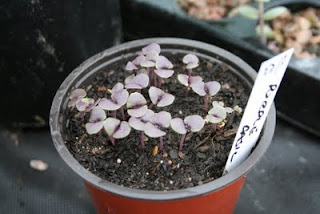
12 Responses to “Dear Alan Titchmarsh,”
Bravo! I used peat free compost though it has taken me a few years to find a good one and it isnt always easy to source near me. I think people think that peat free compost dries out quickly and is difficult to rewet – this is rubbish. I used compost with wood waste and never have a problem and I have strong and healthy plants.
Its time the old guard listened to the new guard so to speak!
What a brilliant blog – nothing more to be said. dawn1ee
Excellent post! I can't understand why there's a resistance to stopping the use of peat in amateur gardening – its not like its something we've used for thousands of years after all (it being introduced on a large scale into horticulture in the mid-late 20th century). You manage without, I manage without it and those Victorian gardeners managed without it – why can't Alan Titchmarsh?
What a really excellent article! My feelings entirely but infinitely better expressed
Hear! hear!
If he can't say anything sensible he should stick to presenting naff afternoon telly.
Great, confindent blog. Newbies to gardening need confident information like this. They also need to learn that is is just a 'growing media' and lose the obsession with 'compost'
I like to think that the great AT was having an off day too. Without his inspiration in the nineties I wouldn't be a professional gardener now.
DigKAW
Thanks to you all for your comments. I've been thinking about this for a few days and instinctively wanted to just show what can be done.
Patient – Nice to be considered part of the 'new guard'. I'm only 12 years younger than Alan, which isn't much. I think it's as much to do with old-style hortic training. Still prevalent, I'm afraid
I second that! My husband and I have a continuing battle about peat free compost. He thinks it isn't as good a growing medium, I think you just have to be careful which one you buy. It's hard to garden with someone who thinks differently about these things! It's a bit like our other ongoing battle about growing organically, although I am winning that one so maybe there is hope for the other.
I wholeheartedly agree that Alan has the responsibility which goes with huge influence (and Carol is my favourite presenter too).
Nice one Sue. I'm also a peat free zone. Can't really compare, because when I started gardening people were already talking about the disadvantages and so I've never used it. Have to say that other stuff in composts is also not always ecologically desirable – coir for instance. And it's difficult (here at least) to find compost that doesn't have one or the other. Would be interested to know the composition of the type you use?
Totally agree with the posting, Sue. I'm a complete amateur but see no reason at all to even risk damaging the environment more than necessary for what is, after all, just a hobby.
What do you do about loam-based composts, though? All the readily available ones contain some peat. Last year I was trying a mix of sterilised loam and peat-free multipurpose, but I'm not good at keeping records of such experiments!
Steve
Hi Steve, I don't use loam-based composts here. If I want to add weight to a mix I add grit sand. But think air at roots v. important to plant growth and loam based tend to be denser, smaller air spaces. I don't get on with in pots due no worms etc. to open it up.
Only nursery I've seen that use loam based is Great Dixter which they make/mix laboriously by hand. Seems fine for them. Probably holds moisture better.
Well said, Trillium! I never knowingly use peat (as you may remember from Beeb discussions aeons ago) – but sometimes it is very difficult to work out what's in different composts in garden centres. I spent ages wandering round one last week reading labels – eventually came back and blogged about it, so if you have any advice on good peat-free organic compost for fruit & veg, please come over & let me know!
Sue S – coir is considerably more environmentally friendly than peat – have a look at Mark Diacono's recent post for more info. about why.